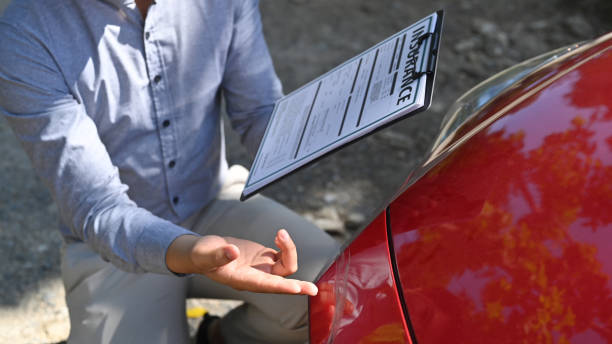If you have been in a car accident, you may be wondering how to file an insurance claim to cover the damages and losses you have sustained. Filing an insurance claim can be a complex and time-consuming process, but it is an important step in getting the financial assistance you need to repair or replace your vehicle and pay for any medical bills or other expenses resulting from the accident.
This guide will provide you with an overview of the process for filing an insurance claim for a car accident, including what you need to do to prepare, what to expect during the claims process, and how to handle disputes or challenges that may arise.

Determine if you are covered for the damages and losses sustained in the car accident
Before you can file an insurance claim for a car accident, it is important to determine if you are covered for the damages and losses you have sustained. The coverage you have will depend on the specific terms of your insurance policy. If you are at fault for the accident, your policy’s collision coverage may cover the damages to your own vehicle, as well as any injuries or damages you may have caused to the other driver or their vehicle.
If you are not at fault, your policy’s uninsured or underinsured motorist coverage may cover your damages if the other driver does not have sufficient insurance or if you were involved in a hit-and-run accident. It is important to carefully review your policy to understand what types of coverage you have and what is excluded. If you are unsure about your coverage, you should contact your insurance company for clarification.
Gather all necessary documentation, including police reports and medical bills
One of the most important steps in filing an insurance claim for a car accident is gathering all necessary documentation. This includes any police reports, medical bills, and other records related to the accident. It is important to be as thorough as possible in gathering documentation, as this will help to strengthen your case and ensure that you receive the maximum amount of compensation available under your policy.
The police report is a crucial piece of documentation, as it will provide details about the circumstances of the accident and may include information about who was at fault. Make sure to get a copy of the police report as soon as possible, as it may take some time for the report to be completed.
Medical bills are also an important type of documentation, as they will provide evidence of any injuries or medical treatment you received as a result of the accident. Make sure to keep copies of all bills, receipts, and other documentation related to your medical treatment.

In addition to police reports and medical bills, you should also gather any other documentation that may be relevant to your claim. This may include repair estimates, photographs of the damage to your vehicle, witness statements, and any other documentation that can help to support your case. By gathering all necessary documentation upfront, you can ensure that you are prepared to present a strong case to your insurance company and increase your chances of receiving a fair settlement.
Contact your insurance company to report the accident and begin the claims process
Once you have gathered all necessary documentation, the next step in the process of filing an insurance claim for a car accident is to contact your insurance company to report the accident and begin the claims process. You should notify your insurance company as soon as possible after the accident, as there may be time limits on when you can file a claim.
To report the accident, you will typically need to provide your insurance company with basic information about the accident, including the date and time it occurred, where it took place, and the names and contact information of any other drivers or passengers involved. You should also provide a brief description of the accident and any injuries or damages that were sustained.

After you have reported the accident, your insurance company will typically assign a claims adjuster to your case. The claims adjuster will be responsible for reviewing your claim and determining the amount of compensation you are entitled to receive. The claims adjuster may also contact you to gather additional information or documentation, or to schedule an inspection of your vehicle to assess the damage.
It is important to be cooperative and responsive during the claims process, as this will help to ensure that your claim is processed smoothly and efficiently. Make sure to keep track of all communication and documentation related to your claim, as this will be useful if you need to follow up or dispute any decisions made by the insurance company.
Provide all requested documentation to your insurance company
After you have reported the car accident to your insurance company and the claims process has been initiated, it is important to provide the company with all requested documentation as soon as possible. This may include the police report, medical bills, repair estimates, and any other documentation that supports your claim. It is important to be thorough in providing this documentation, as it will help to strengthen your case and increase the chances of receiving a fair settlement.
To ensure that your claim is processed smoothly, make sure to follow any instructions or guidelines provided by your insurance company for submitting documentation. This may include providing original copies of documents, or making copies of documents and sending them through a specific channel.
It is also a good idea to keep track of all documentation and communication related to your claim, as this will be useful if you need to follow up or dispute any decisions made by the insurance company. By providing all requested documentation and being responsive to requests for information, you can help to ensure that your claim is processed efficiently and that you receive the maximum amount of compensation available under your policy.
Negotiate with the insurance company for a fair settlement

After you have provided all necessary documentation to your insurance company, the claims adjuster will review your claim and determine the amount of compensation you are entitled to receive. This may include payments to cover the cost of repairing or replacing your vehicle, as well as compensation for any medical bills or other expenses resulting from the accident.
It is important to remember that the initial settlement offer made by the insurance company is not necessarily the final amount you will receive. If you believe that the offer is not fair or does not adequately cover your damages and losses, you have the right to negotiate for a higher amount.
To negotiate a fair settlement, it is helpful to have a clear understanding of your policy and the coverage it provides. You should also be prepared to provide additional documentation or evidence to support your claim for a higher settlement. This may include repair estimates, photographs of the damage to your vehicle, and other documentation that shows the full extent of your damages and losses.
Remember that the claims adjuster is just doing their job, and that it is in the best interests of both you and the insurance company to reach a fair settlement. By being reasonable and cooperative, you may be able to reach a mutually satisfactory agreement without the need for further disputes or legal action.
Understand the claims process and what to expect

To successfully file an insurance claim for a car accident, it is important to understand the claims process and what to expect. The claims process can vary depending on the specifics of your case and the terms of your policy, but there are some general steps that are common to most claims.
The first step in the claims process is to report the accident to your insurance company and provide them with all necessary documentation, including police reports and medical bills. The company will then assign a claims adjuster to your case, who will review your claim and determine the amount of compensation you are entitled to receive.
Once the claims adjuster has made a determination, you will typically receive a settlement offer from the insurance company. If you believe that the offer is fair and covers all of your damages and losses, you can accept the offer and receive your compensation. If you believe that the offer is not fair, you can negotiate for a higher amount or dispute the decision.
It is important to keep in mind that the claims process can take time, and it may be several weeks or even months before you receive a settlement offer. You should also be prepared for the possibility that your claim may be denied, in which case you may need to seek legal guidance or take other steps to pursue compensation.
By understanding the claims process and what to expect, you can be better prepared to handle any challenges that may arise and increase your chances of receiving a fair settlement
Know your rights and options if you are not satisfied with the settlement offer

If you are not satisfied with the settlement offer made by your insurance company after filing a claim for a car accident, it is important to know your rights and options. While the insurance company has the right to make the initial determination of your entitlement to compensation, you have the right to challenge their decision if you believe that it is unfair or does not adequately cover your damages and losses.
One option you have if you are not satisfied with the settlement offer is to negotiate for a higher amount. To do this, you should be prepared to provide additional documentation or evidence to support your claim for a higher settlement. This may include repair estimates, photographs of the damage to your vehicle, and other documentation that shows the full extent of your damages and losses. It is also a good idea to be professional and respectful when negotiating with the insurance company, as this may increase the chances of reaching a mutually satisfactory agreement.
If you are unable to reach a satisfactory settlement through negotiation, you may need to consider other options. One option is to seek legal guidance from an experienced attorney who can help you to understand your rights and options and advise you on the best course of action. Another option is to file a complaint with the state insurance commissioner, who has the authority to investigate and resolve disputes between policyholders and insurance companies.
It is important to remember that you have rights and options if you are not satisfied with the settlement offer made by your insurance company. By understanding your rights and taking the appropriate steps to protect them, you can ensure that you receive a fair settlement and get the financial assistance you need to cover your damages and losses.
Keep track of all communication and documentation related to the claim
As you go through the process of filing an insurance claim for a car accident, it is important to keep track of all communication and documentation related to the claim. This includes any communication with your insurance company, such as phone calls or emails, as well as any documents or other materials that you receive or provide to the company.
Keeping track of this information is important for a number of reasons. First, it can help you to stay organized and ensure that you are providing all necessary documentation in a timely manner. It can also be helpful to have a record of your communication with the insurance company if you need to follow up on any outstanding issues or if you need to dispute any decisions made by the company.
To keep track of communication and documentation related to your claim, it is a good idea to create a folder or file where you can store all relevant materials. You should also make notes of any phone conversations or meetings you have with the insurance company, including the date, time, and any important details discussed.
By keeping track of all communication and documentation related to your claim, you can help to ensure that your claim is processed smoothly and efficiently, and that you are able to get the financial assistance you need to cover your damages and losses.
Consider seeking legal guidance if necessary
if you are having difficulty navigating the claims process, you may want to consider seeking legal guidance. An experienced attorney can help you to understand your rights and options and advise you on the best course of action.
There are a few reasons why you might consider seeking legal guidance when filing an insurance claim for a car accident. One reason is if you believe that the insurance company is acting in bad faith, or if you feel that they are not treating you fairly. In these cases, an attorney can help you to understand your legal options and advise you on the best way to proceed.

Another reason to consider seeking legal guidance is if you are having difficulty negotiating a fair settlement with the insurance company. An attorney can help you to present a strong case for a higher settlement and negotiate on your behalf to ensure that you receive a fair amount of compensation.
It is important to keep in mind that seeking legal guidance does not necessarily mean that you need to go to court. In many cases, an attorney can help you to resolve your dispute with the insurance company through negotiation or alternative dispute resolution methods, such as mediation or arbitration.
If you are considering seeking legal guidance in connection with an insurance claim for a car accident, it is a good idea to speak with an attorney as soon as possible. An attorney can help you to understand your rights and options and advise you on the best course of action to take.
Why Life Insurance is a Must-Have for Protecting Your Loved Ones
Take steps to prevent future accidents and protect yourself financially
After you have filed an insurance claim for a car accident, it is important to take steps to prevent future accidents and protect yourself financially. While you cannot always control when or how an accident will occur, there are steps you can take to reduce the risk of being involved in an accident and to protect yourself financially if one does happen.
One way to prevent future accidents is to be a safe and responsible driver. This includes following all traffic laws, maintaining a safe following distance, and avoiding distractions such as texting or talking on the phone while driving. It is also a good idea to stay alert and be aware of your surroundings, as this can help you to anticipate and avoid potential hazards on the road.

In addition to being a safe driver, you can also protect yourself financially by making sure you have the right insurance coverage. This includes having enough liability coverage to protect you if you are found to be at fault in an accident, as well as having sufficient coverage for your own vehicle. It is a good idea to review your insurance policy periodically to make sure that you have the coverage you need.
Finally, you can also protect yourself financially by taking steps to reduce the risk of being involved in an accident. This may include driving a safer vehicle, avoiding driving at night or in adverse weather conditions, and staying sober when driving. By taking these steps, you can reduce the risk of being involved in an accident and protect yourself financially if one does occur.
Conclusion
Filing an insurance claim for a car accident can be a complex and time-consuming process, but it is an important step in getting the financial assistance you need to repair or replace your vehicle and pay for any medical bills or other expenses resulting from the accident. By following the steps outlined in this guide, you can prepare for the claims process, negotiate for a fair settlement, and protect your rights if you are not satisfied with the settlement offer. By being proactive and taking the appropriate steps, you can increase your chances of receiving a fair settlement and getting the financial assistance you need to cover your damages and losses.
